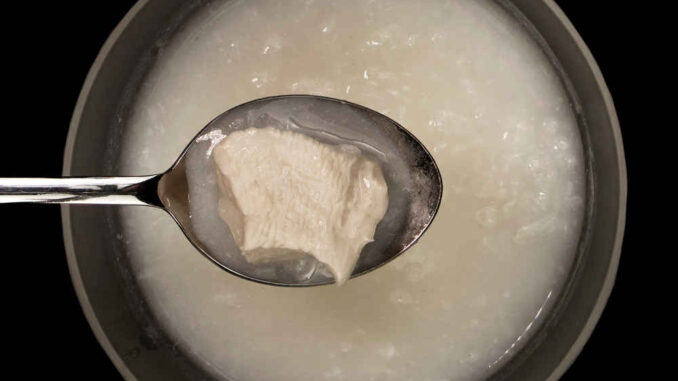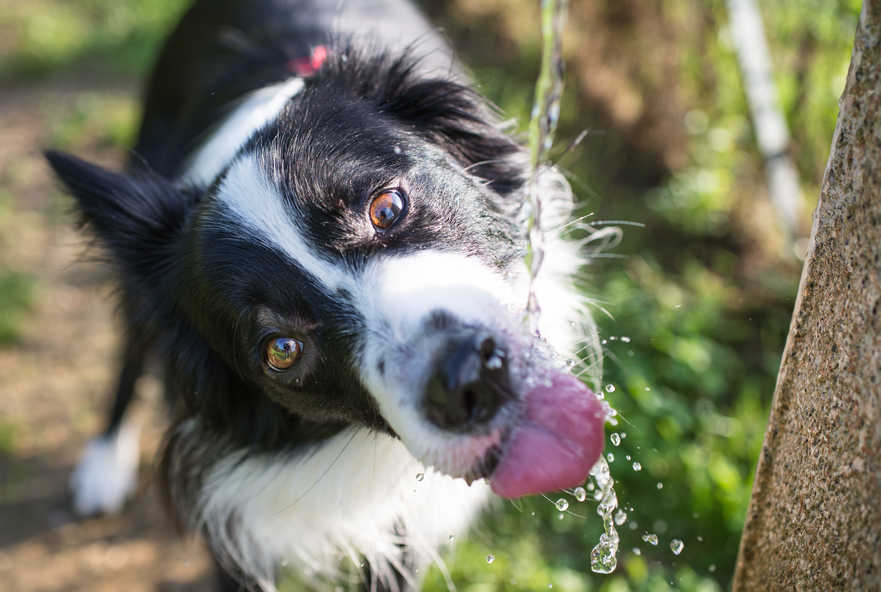
Scooping poop isn’t anybody’s favorite chore. However, the appearance of your dog’s feces can provide important information about their health and well-being. Black stools, in particular, are often a sign of bleeding into the upper gastrointestinal tract and are almost always an indicator to see your veterinarian right away. Here’s what pet parents should know and what you may be able to do at home to help.
When is it ok to try home remedies for black stools?
It may be ok to try home remedies with the following situations:
- your dog has black stools but is otherwise acting normal / doing well (with no other clinical signs),
- if you have been able to identify a source of the blood (such as licking a bleeding wound), or
- if you have recently changed your dog’s diet,
In these situations, it may be ok to monitor at home for up to 48 hours. If the black stools do not resolve after that, they will need to see the vet. If at any point you notice additional clinical signs such as those listed below, see your vet as soon as possible: it is then not recommended to try home remedies for black stools. The black stools conditions – known as melena – is most often associated with bleeding into the upper gastrointestinal (GI) tract and is a serious health concern.
While you would think that blood in the stool would appear red, it actually turns black after going through the digestive process. If you do happen to see red blood in your pup’s poop, it’s a sign that the bleeding is coming from the lower GI tract, such as the colon, rectum, anus, or anal glands.
What you can do at home to help a dog with black stools (in dogs who are otherwise normal)
While you wait for your appointment with your veterinarian, you can try the following:
1. Check for injuries
One possible cause of melena is the ingestion of blood. Typically dogs need to ingest 100-200 mL of blood for their stool to appear black. Check your dog over for any wounds or bleeding from the nose or mouth.
2. Monitor bowel movements
If you notice black feces, continue to monitor your dog’s bowel movements and keep an eye on what they are eating. Also, watch for any other clinical signs such as diarrhea, vomiting, loss of appetite, bleeding or bruising, lethargy, pale gums, or weight loss, which indicate the need to see your vet right away.
3. Offer a bland diet
Mild GI upset may respond to a bland diet. You can purchase a prescription bland diet from your vet or make your own such as plain boiled skinless boneless chicken and rice. See our recommended recipes here.

4. Consider a probiotic
Probiotics, such as Fortiflora, can help restore the normal/good bacteria in your dog’s GI tract, help promote GI health, and aid in the treatment of mild GI upset.
- Number one probiotic supplement recommended by veterinarians (Kantar Veterinary Tracker, 2020)
5. Keep your pup well hydrated
Make sure that your pup has access to fresh water. You may encourage drinking by adding a small amount of low-sodium chicken broth to their water or offering a canned bland diet to up their water intake.

6. Use year-round flea, heartworm, and parasite prevention
Intestinal parasites are a potential cause of melena. The best way to prevent parasites is to use a monthly preventative year-round. There are many options available, and your vet can help recommend one that may be best for your dog’s lifestyle.
7. Feed an AAFCO-approved nutritionally balanced diet (and avoid raw diets)
Feeding a nutritionally balanced diet is key for keeping your pup happy and healthy. Raw diets come with increaded risks of infection and parasites, and are generally not recommended.
Common causes of black stools in dogs [Overview]
Black stool in a dog is most often associated with blood in the upper gastrointestinal tract. When blood is digested it becomes black, leading to feces that are black, tarry, or similar to coffee grounds in appearance. If bleeding occurs lower in the GI tract or from the anus, it will appear bright red. Possible causes of black stool, also known as melena, include:
- Ingestion of blood – If your dog is licking a bleeding wound, swallows blood from a nosebleed, or has significant bleeding in the mouth due to dental disease, it can cause the stool to appear black.
- Gastrointestinal bleeding – The most common cause of black stools is internal bleeding in the gastrointestinal tract. This can occur due to a variety of conditions, such as ulcers, which can form in the esophagus, stomach, or upper part of the small intestine due to medications, infection, irritation, or inflammation. Hemorrhagic gastroenteritis is another serious condition leading to bloody stool, vomiting, loss of appetite, and lethargy. Another cause can be a foreign object that your dog ingested, leading to injuries or perforations in the GI tract.
- Medication side effects or toxin ingetion – Certain medications can lead to black stools in dogs. For example, non-steroidal anti-inflammatory drugs (NSAIDs) used for pain relief can cause GI irritation, ulceration, and potentially bleeding. Additionally, some medications, such as Pepto Bismol, activated charcoal, or other medications containing iron, can darken the stool color. Certain toxins, such as rat bait, can also cause bleeding issues.
- Parasites or infection – Some intestinal parasites and bacterial infections can cause bleeding in the digestive tract, leading to black stools. Your vet can perform a fecal examination to diagnose these conditions.
- Diet – Certain foods can cause black stools. In these cases, changing your dog’s diet may be recommended.
- Cancer – Tumors in the mouth, throat, or GI tract can cause internal bleeding leading to black stools. If a tumor is suspected, your veterinarian will likely need to perform additional tests to confirm the diagnosis and determine the best treatment course.
- Other systemic disease – certain conditions, such as Addison’s disease or bleeding or clotting disorders, can lead to the presence of black stool, among other clinical signs.
See our article on the most common causes of black dog poop for a complete list of possible causes and more details.
When does my dog with black poop need to see the vet?
Other early signs and symptoms to watch for
Depending on the underlying cause of your dog’s black stools, you may notice some of the following symptoms:
- Bleeding from a wound, mouth, or nose
- Vomiting
- Diarrhea
- Decreased appetite
- Lethargy
- Weakness
- Bruising
- Pale gums
- Weight loss
Veterinary diagnostics and treatments of black stool
There are several tests that your vet may recommend to find the underlying cause of your dog’s black stools. They will start by getting a thorough history and performing a nose-to-tail exam, likely including a rectal exam.
- Fecal – A fecal test can be used to check for parasites and the presence of blood in your dog’s poop.
- Bloodwork – A complete blood count (CBC) can check for anemia, which might be a result of prolonged internal bleeding. Coagulation profiles may be run to ensure that your dog’s blood is clotting properly, and a biochemistry panel can provide information on overall systemic health and major organ function.
- Imaging – Abdominal x-rays or ultrasound can provide a visual representation of your dog’s internal organs, revealing any abnormalities, foreign bodies, or tumors.
- Endoscopy or colonoscopy – These procedures may be recommended occasionally and involve inserting a small camera into the dog’s digestive tract to visually inspect for ulcers, tumors, or other abnormalities. Biopsies can be taken for further analysis.
Treatment will depend on the underlying cause and condition of your dog. Dogs with parasites will need a dewormer. In some cases, your vet may recommend a diet change or an adjustment to your dog’s medications. Dogs with ulcers or hemorrhagic gastroenteritis may also get antibiotics, anti-nausea medications, and gastroprotectants, while a foreign body, trauma, or tumor may require surgery. If a dog has experienced significant blood loss, they may require hospitalization and a blood transfusion.
Frequently Asked Questions
Can black stools in dogs be a sign of a serious health issue?
Yes, black stools can be a sign of bleeding into the upper GI tract, which can be due to a serious health issue such as an ulcer, cancer, or bleeding disorder. There are also other possible causes that are less severe, but it’s still important to get checked by the vet for testing and appropriate treatment.
How long should I try home remedies before seeking veterinary care?
This isn’t an issue that you should wait on, as it can be a sign of a serious underlying issue such as internal bleeding. If your dog has several black bowel movements you should schedule an appointment with your vet, especially if they are showing other symptoms of illness.
Are there any over-the-counter medications I can give my dog?
No, in this situation there are not any appropriate over-the-counter medications that will be safe or helpful for your dog.
Disclaimer: This website's content is not a substitute for veterinary care. Always consult with your veterinarian for healthcare decisions. Read More.






Be the first to comment